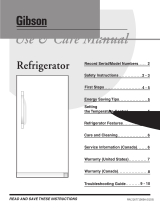
4
nOtE
The exterior walls of the refrigerator may become quite
warm as the compressor works to transfer heat from
the inside. Temperatures as much as 30° F warmer
than room temperature can be expected. For this
reason it is particularly important in hotter climates
to allow enough space for air circulation around your
refrigerator.
Leveling
The refrigerator must have all bottom corners resting
rmly on solid oor. The oor must be strong enough
to support a fully loaded refrigerator. NOTE: It is Very
Important for your refrigerator to be level in order to
function properly. If the refrigerator is not leveled during
installation, the door may be misaligned and not close
or seal properly, causing cooling, frost, or moisture
problems.
To Level Your Refrigerator:
After removing all interior and exterior packaging
materials, and after discarding crating screws and wood
base, use a carpenter’s level to level the refrigerator from
front-to-back. Adjust the plastic leveling feet in front, ½
bubble higher, so that the door closes easily when left
halfway open. from front-to-back. Adjust the leveling
legs in front, ½ bubble higher, so that the door closes
easily when left halfway open.
Cleaning
Wash any removable parts of the refrigerator •
interior, and exterior with mild detergent and warm
water. Wipe dry. Do not use harsh cleaners on these
surfaces.
Do not use razor blades or other sharp instruments, •
which can scratch the appliance surface when
removing adhesive labels. Any glue left from the tape
can be removed with a mixture of warm water and
mild detergent, or touch the residue with the sticky
side of tape already removed. Do not remove the
serial plate.
Install the refrigerator in the coolest part of a dry •
and ventilated room, out of direct sunlight and away
from heating ducts or registers. Do not place the
refrigerator next to heat-producing appliances such
as a range, oven or dishwasher.
Level the refrigerator so the door close tightly.•
Do not overcrowd the refrigerator or block cold air •
vents. Doing so causes the refrigerator to run longer
and use more energy. Shelves should not be lined
with aluminum foil, wax paper or paper toweling.
Liners interfere with cold air circulation, making the
wine cooler less efcient.
Wipe bottles and containers dry before placing them •
in the refrigerator. This cuts down on moisture build-
up inside the unit.
Organize the refrigerator to reduce door openings. •
Remove as many items as needed at one time and
close the door as soon as possible.
InStALLAtIOn
This Use & Care Guide provides general operating
instructions for your model. Use the refrigerator only as
instructed in this Use & Care Guide. Before starting the
refrigerator, follow these important rst steps.
Location
Choose a place that is near a grounded electrical •
outlet. Do Not use an extension cord or an adapter
plug.
For the most efcient operation, the refrigerator •
should be located where surrounding temperatures
will not drop below 10° F (-12° C) or exceed 110°
F (43° C). The Freeze Control Feature is designed
to automatically maintain the selected interior
refrigerator temperature within these boundaries.
Allow space around the unit for good air circulation. •
Leave a 5 inch (50 mm) space on the back and
the sides, and 12 inches (300 mm) above the
refrigerator for adequate circulation.
cAutIOn
To allow door to close and seal properly, DO NOT let
food packages extend past the front of shelves.
ENERGY SAVING TIPS
ENERGY SAVING TIPS















